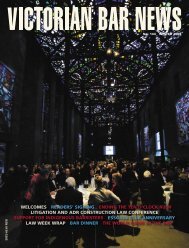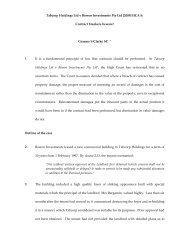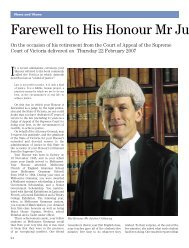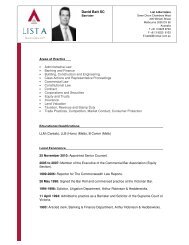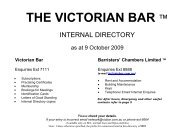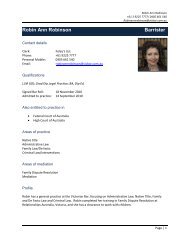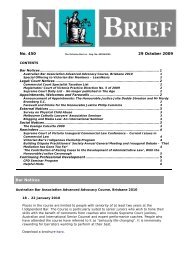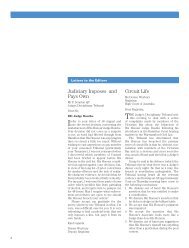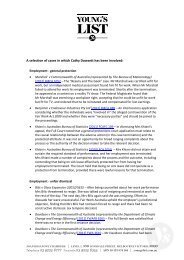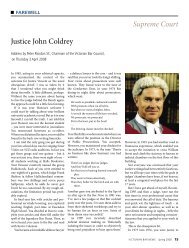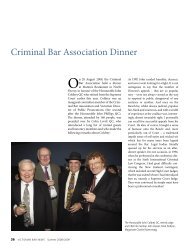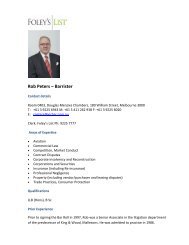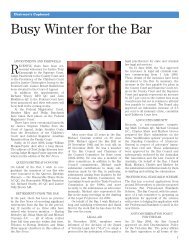Justice William Charles Crockett AO - Victorian Bar
Justice William Charles Crockett AO - Victorian Bar
Justice William Charles Crockett AO - Victorian Bar
- No tags were found...
Create successful ePaper yourself
Turn your PDF publications into a flip-book with our unique Google optimized e-Paper software.
38ters, such as on non-fundamentalissues of procedure, an insubstantialerror in admitting this or that pieceof evidence or a misdirection on aparticular point of fact or law arisingin the trial may not touch the fundamentalrequirement of having a trial“according to law”. But where theerror that is established involvesa mistaken direction with respectto an essential ingredient of theoffence and a misdescription tothe decision-maker (here the jury)of the content of that ingredient,a real question is presented as towhether the outcome then trulyanswers to a trial “according tolaw”.[141] Clearly, the language of the “proviso”is only enlivened when mistakeshave happened. The mistakes which[the proviso] contemplates include,explicitly, “the wrong decision on anyquestion of law”. However, the “proviso”is manifestly to be understoodagainst the background of the fundamentalassumption that high standardsof lawfulness are observed inthe conduct of criminal trials …[142] … The appellate court, decidingthe “proviso” question, is obliged toreach its own conclusion accordingto the statutory criteria. However,necessarily, it does so in the contextof a legal system that observes highstandards of compliance with thelaw; is protective against miscarriagesof justice and wrongful convictions;and ordinarily appliesthe rigorous criterion for proofof criminal guilt, namely proofbeyond reasonable doubt. [Footnotesomitted; emphasis added.]And later he observed:[161] … (1) … In a court of error, suchas this, where a serious mistake oflaw is revealed, there is a strongreason of principle why suchmistakes should ordinarily bemarked by the provision of reliefand an order for a retrial. Indeed,this is the primary instruction ofthe Code itself (“shall allow theappeal”).(2) The foregoing is especially sowhere the mistake has involved amisdescription to the jury of theingredients of the offences chargedagainst the appellants. Misdirectionsof such a kind are more serious thanothers. … The increasing insistenceof appellate courts upon theaccurate explanation to juriesof the central ingredients of theoffence(s) charged is, in my opinion,a reason for the greater cautionin the intermediate courts inthe application of the “proviso” inrecent years. Nothing said by theCourt in Weiss suggests a reversalof that caution. It really speaks foritself. If the decision-maker in thetrial (the jury) is misled as to itsessential function and providedwith an incorrect statement of theapplicable legal components ofthe offence, the postulate of a trialaccording to law is not fulfilled.No amount of appellate reasoningcan then replace that normal entitlementbelonging to all personsaccused of serious crimes. The“proviso” assumes that the essentialpostulate has been fulfilled... [Footnotes omitted; emphasisadded.]It is probably too early todiscern any trends in thejudgments of intermediateappellate courts so as topredict those cases wherethe proviso will not standin the way of a successfulappeal.Although Kirby J was in the minority, itmight be argued that his observations areto be regarded as of general application. 36Again, some propositions may be isolated:• An accused is normally entitled to havethe jury resolve contested questions offact by the application of the applicablelaw correctly explained to them i.e.“according to law”.• A legal mistake in peripheral mattersmay not touch the fundamentalrequirement of having a trial “accordingto law”.• But where the error that is establishedinvolves a mistaken direction withrespect to an essential ingredient ofthe offence and a misdescription tothe jury of the content of that ingredient,a real question is presentedas to whether the outcome thentruly answers to a trial “according tolaw”.• The proviso is to be understood againstthe background of the fundamentalassumption that high standards of lawfulnessare observed in the conduct ofcriminal trials.• The appellate court, deciding the provisoquestion, does so in the contextof a legal system that observes highstandards of compliance with the law;is protective against miscarriages ofjustice and wrongful convictions; andordinarily applies the rigorous criterionfor proof of criminal guilt.• Where there is a serious mistake of law,there is a strong reason of principlewhy such a mistake should ordinarilybe marked by the provision of reliefand an order for a retrial. That is theprimary instruction of the legislation(i.e. “shall allow the appeal”).• The proviso assumes that the essentialpostulate of a trial according to law hasbeen fulfilled.• If the jury is misled as to its essentialfunction and provided with an incorrectstatement of the applicable legalcomponents of the offence, the postulateof a trial according to law is notfulfilled.INTERMEDIATE APPELLATE COURTSPOST-WEISSWarren CJ recently observed of the invocationof the proviso post-Weiss that this“is a more complex and difficult processthan was previously so”. 37 That observationechoes earlier observations made bythe Court of Appeal (Vic.) as to “internaltensions” to be found in the propositionslaid out in the High Court’s judgment. 38It is probably too early to discern anytrends in the judgments of intermediateappellate courts so as to predict thosecases where the proviso will not stand inthe way of a successful appeal. However,post-Weiss the proviso has not beenapplied where there has been a misdirectiontouching the burden of proof, 39incorrect admission of opinion evidence 40or tendency evidence, 41 or a failure properlyto direct on propensity evidence. 42Nor was the proviso successfully invokedfor misdirections on crucial identificationevidence 43 or on consent in a rape case. 44Similarly, where the prosecutor madean inflammatory address, 45 or indulgedin improper cross-examination of theaccused, the proviso was not applied. 46And where a judge made very strongcomments in summing up adverse to theaccused, 47 and in another case left to thejury a possible basis for conviction notrelied upon by the Crown, 48 the provisodid not defeat the appeal.



